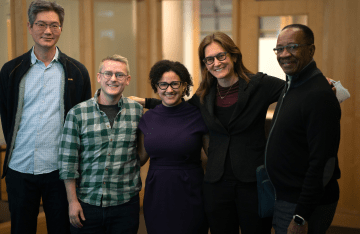Research Identifies Factors That Make Correcting Misinformation About Science More Successful
A new study from PIK Professor Dolores Albarracín and Research Associate Man-pui Sally Chan investigates effective ways to correct misinformation about science.

In an article titled “A Meta-analysis of Correction Effects in Science-Relevant Misinformation” published last week in the journal Nature Human Behaviour, University of Pennsylvania social psychologists and communication scholars Man-pui Sally Chan and Dolores Albarracín explain the circumstances under which corrections of misinformation about science are most likely to work or fail, as well as the characteristics of the corrections most likely to succeed.
The authors conducted a meta-analysis, a quantitative synthesis of prior research, which involved 60,000 participants in 74 experiments. Each experiment either assessed belief in misinformation about science or introduced misinformation about science as accurate and then introduced corrections for the misinformation.
Although on average the corrections failed to accomplish their objectives, they worked better when the issue in the correction was emotionally more positive than the misinformation, the correction matched the ideology of the recipients, the issue was not politically polarized, and the correction provided abundant details as to why the earlier claims were false.
Can Science-Relevant Misinformation Be Corrected on Average?

The researchers found that “attempts to debunk science-relevant misinformation were, on average, not successful,” said Chan, the lead author and a research associate at the Annenberg School for Communication at the University of Pennsylvania. “Therefore, most of the science-relevant misinformation goes uncorrected even when a debunk is presented. People believe in the misinformation as much before as after the debunk. This is quite notable, because corrections in other domains, such as reports about an accident or political event, do reasonably well, as shown by past research. However, this does not occur in the domain of misinformation about science.”
The researchers conducted their study with two goals in mind. The first was gauging whether the misinformation can be corrected; the second was determining which types of corrections fare better than others.
Is It Easier To Correct Good News or Bad News?

To achieve those goals, the team began by figuring out whether negative or neutral misinformation is easier to correct. Their investigation confirmed that positive misinformation, which makes people “feel good about themselves, their future, or the world more generally,” the study says, is more challenging to correct than negative misinformation.
“We humans like to keep our rose-tinted glasses on, and we are resistant to debunking pseudoscience that feels good,” said Albarracín, the Alexandra Heyman Nash University Professor of the University of Pennsylvania and director of the Science of Science Communication division of the Annenberg Public Policy Center. “It is far easier to correct hype about a chemical spill that didn’t happen than about deforestation that is happening. The reason is that it’s more pleasant to move from pessimistic to optimistic news rather than the other way around.” Good news corrects negative misinformation more easily than bad news corrects positive misinformation, she says.
Detailed Corrections
The researchers also asked what corrective messages are most successful. They found that when a correction offers a detailed explanation, the audience is more likely to be receptive, and the misinformation is more likely to be debunked. The process through which this occurs involves two stages. First, the particulars and information in the correction offer the respondent a new model through which to understand the event described in the misinformation. Then, this new representation of what produced the event replaces the initial model created by the misinformation.
The Alignment of the Correction With a Recipient’s Ideology
Chan and Albarracín also examined whether an individual’s attitudes or beliefs “affect the success of corrections of science-relevant misinformation.” They found that when the debunking contradicts people’s ideology, recipients are more likely to reject the correction and reinforce their support for the misinformation. So, for example, a person with a left-leaning ideology is disposed to accept a correction of claims opposing climate change. In contrast, when the debunking contradicts people’s ideology, recipients are more likely to reject the correction and reinforce their support for the misinformation.
When a Topic Is Politically Polarized, and Ways To Succeed
Another important factor is political polarization around the scientific issue being discussed. The study found that when a topic is polarized, as, for example, Covid-19 vaccination, the correction often fails. “It’s more than twice as hard to debunk polarized misinformation than it is to correct non-polarized misinformation,” Albarracín said.
There are, however, ways to correct misinformation. Once obstacles can be accounted for, they can be worked around. Chan recommended “using corrections that are detailed, increasing familiarity with the topic in the audience, making discussions of science not about politics to depolarize them. But if the topic is already politically polarized, then the correction must be written in a way that aligns with the recipient’s politics.”
Chan is part of a research team led by Albarracín that is focused on finding ways to curb the effects of scientific misinformation. Other recently published research by her team demonstrated that without having to confront misinformation about an issue, its effects can be circumvented or “bypassed” by bolstering beliefs that increase support for policies that are socially beneficial.
The article, “A meta-analysis of correction effects in science-relevant misinformation,” was published June 15, 2023, in Nature Human Behaviour.



